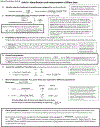The Meta-analysis Application Worksheet: A practical guide for the application of meta-analyses to clinical cases
- PMID: 39619795
- PMCID: PMC11606584
- DOI: 10.1037/pro0000565
The Meta-analysis Application Worksheet: A practical guide for the application of meta-analyses to clinical cases
Abstract
Despite efforts to incorporate evidence-based practice into mental health settings, there has been inconsistent success doing so. Several barriers to the implementation of evidence-based practice have been identified, including limitations in time and statistical training. One promising approach to further bridge the science-practice gap is the greater use of meta-analytic studies to clarify the magnitude of treatment effects and to understand components of treatments that are more effective within specific populations. Although several articles have been published to help mental health trainees and providers understand and interpret meta-analyses, they may not be sufficient without extensive training in statistical techniques. The purpose of this article is to provide and explain the use of the Meta-analysis Application Worksheet as a means by which mental health providers at all professional levels can use meta-analytic findings to make clinical judgements regarding treatment approaches in the context of ongoing or new cases. A case example is provided to illustrate the use of the Worksheet in clinical decision-making.
Keywords: clinical decision-making; dissemination; evidence-based practice in psychology; evidence-based treatment; meta-analysis.
Conflict of interest statement
Conflict of Interest Statement: The authors declare that there is no conflict of interest.
Figures
References
-
- Aiken LS, West SG, & Millsap RE (2008). Doctoral training in statistics, measurement, and methodology in psychology: Replication and extension of Aiken, West, Sechrest, and Reno's (1990) survey of PhD programs in North America. American Psychologist, 63, 32–50. 10.1037/0003-066X.63.1.32 - DOI - PubMed
-
- American Psychiatric Association (2022). Diagnostic and Statistical Manual of Mental Disorders Fifth Edition Text Revision (DSM-5-TR). American Psychiatric Publishing.
-
- Borenstein M, Hedges LV, Higgins JP, & Rothstein HR (2011). Introduction to meta-analysis. John Wiley & Sons.
Grants and funding
LinkOut - more resources
Full Text Sources
Miscellaneous


